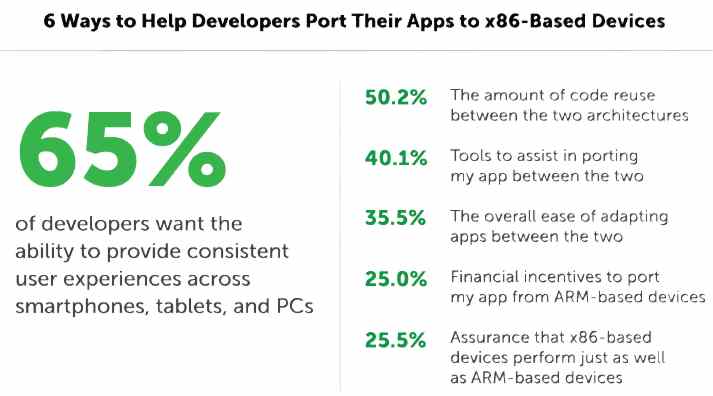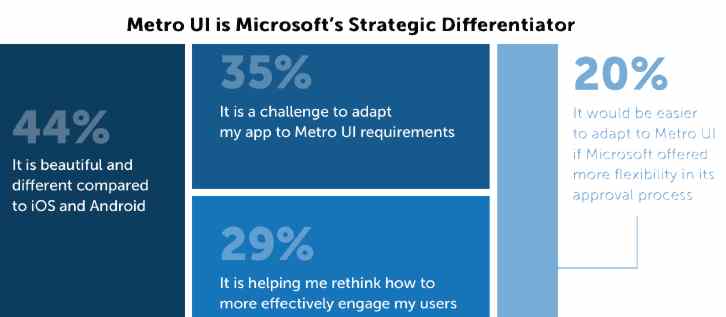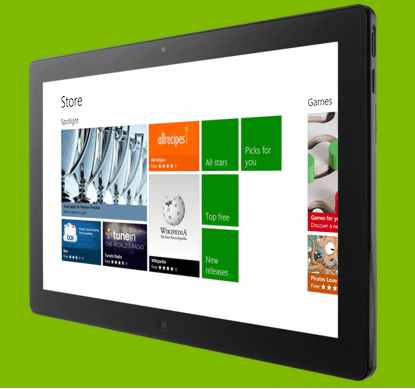| Perceptions of Microsoft's Windows 8 Tablets |
| Written by Lucy Black | |||
| Sunday, 12 August 2012 | |||
|
The Metro UI is Microsoft's "strategic differentiators" - which makes it all the more frustrating that a name that has caught the imagination has had to be scrapped. But a rose by any other name could just as well be a stink wort and what matters is the substance. The recent Appcelerator/IDC survey of Appcelerator Titanium users found that a third of a total of 3783 respondents are very interested in developing for Windows 8 tablets, commenting: This is an objectively strong number for a device class that is not yet commercially available. The report goes on to comment on the fact that Microsoft has announced both Windows 8 tablets based on x86 architectures and WinRT tablets on ARM-based architectures and proposes that tools be provided to help developers port their existing apps for ARM-based devices (most smartphones and the iPad) to x86-based devices. The survey included the question: "What factors would most increase your interest level in porting your apps from ARM-based devices to x86-based devices" and on the basis of 3335 responses it came up with the following wish list:
The survey also asked developers what they thought of the user-interface that was called "Metro" at the time the report was published, but would today be referred to as "Modern-style" or even more prosaically "Windows 8 on Windows Phone".
The question, "What are your perceptions of Microsoft's Metro UI?" was answered by 2,395 developers and 44% selected "It is beautiful and different compared to iOS and Android" while 29% agreed with "It is helping me rethink how to more effectively engage my users". Of the less positive responses, 35% chose "It is a challenge to adapt my app to Metro UI requirements" and 20% thought "It would be easier to adapt to Metro UI is Microsoft offered more flexibility in its approval process". Of course, the turmoil that Microsoft has created by replacing the old with the "modern" is only worth it if, not only programmers but also users regard the new as "beautiful and different". Currently this seems to be unlikely for the desktop versions of Windows 8, but we have to wait and see if the tablet and phone form factors wow the audience. In theory, the big benefit for the programmer in moving to Windows 8 apps is that they run on all platforms without modification. However, how compatible the WinRT/Arm and the WP8/phone will be with the desktop x86 operating system remains to be seen. What is clear, is that even if they are 100% compatible, you can't just move an app from one platform to another and expect it to give its best. The reason is, of course, the different screen sizes and hardware. Android probably has the best approach to this in its provision of re-scaling for icons and images and the ability to use panels that reorganize themselves when screen real estate is in short supply. Windows 8 doesn't have facilities for these types of automatic adaptation and this means that hand crafting will still be required and probably with separate editions for desktop, tablet and phone.
More InformationRelated ArticlesApple Leading In the Mobile Enterprise
Comments
or email your comment to: comments@i-programmer.info
To be informed about new articles on I Programmer, install the I Programmer Toolbar, subscribe to the RSS feed, follow us on, Twitter, Facebook, Google+ or Linkedin, or sign up for our weekly newsletter.
|
|||
| Last Updated ( Sunday, 12 August 2012 ) |




